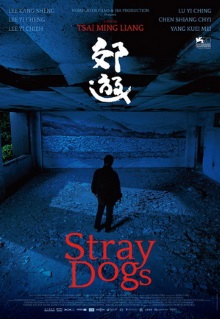
This is the first film by Malaysian-born but long since Taiwan-based director Tsai Ming-liang to be covered in this blog though my wife has watched quite a few of his films. She notes that this one once again stars the director favorite actor Lee Kang-sheng and I read that the trio of actresses who appear in it are part of his usual cast.
Right from the beginning, Stray Dogs is cryptic. The opening shot is a long-haired woman sitting on the edge of a bed watching two children sleep in what looks like a hut. It may be reasonable to presume that this is their mother but we never see this particular actress again. Thankfully some semblance of a narrative does eventually emerge. We gather that the main character is homeless man who works as a living signboard. He has two children, a boy and a girl, and they live together in an abandoned building. In the daytime, the children are left to their own devices and wander the city.
Perhaps the single most striking thing about this film is its sound design. Most films reduce background noises to a low volume but here it stands out in the foreground, omnipresent and impossible to ignore. It can be the rumbling sound of deep snoring as the woman watch the children sleep, implying that the father is present in the scene though he remains unseen. It can be the noisy bustle of the vehicles going past the junction where the man stands with his signboard advertising expensive condos. It can be the burbling sound of water where the children play with trash on the riverside. Yet when it is gone as it is when the characters stare entranced at a mural inside a building, its absence itself is a presence that hangs ominously in the air.
Combined with meticulously constructed images that look like an exercise in artistic street photography, Stray Dogs makes for a mesmerizing sensory experience. Tsai is one of the leading directors of the slow cinema school of film-making so there are plenty of long takes with seemingly little going on. When it works though the effect is heart-stoppingly powerful. A great example of this a close-up of Lee’s face. It takes time for the audience to process the fact that this is a shot of him as he is holding up the signboard. With nothing else to grasp at, it is up to our own minds to intuit an entire lifetime of suffering and frustration from only his face. Then he quietly murmurs a few phrases of Man Jiang Hong as if testing them before belting out the classical poem at full volume as if railing his defiance at the whole world. The effect hits the audience with the force of an explosion.
Unfortunately not every such scene worked for me. For such long takes to be successful, I think I still need enough information to provide a context around which my mind can expand to fill in the blanks. In the first half of the film, Tsai does provide enough of a narrative that we roughly know what is going on. Plus I really liked how authentic all of the little details that he shows of the family needing to live rough, such as having to wash up in public toilets. Yet from the point in which Lee alternately caresses and savages a cabbage, that narrative strand seems to go off the rails. It’s a disturbing scene to be sure, as Tsai no doubt intended, but it’s hard to make any sense of the scenes the follow. Without this context, we still have emotion but it sort of goes nowhere. The final shot, which must be over ten minutes long, is especially cryptic.
Some critics have noted that Stray Dogs shouldn’t be seen in isolation but instead as the culmination of Tsai’s film-making career. The character played by Lee should be regarded as yet another iteration of the same character he has played in Tsai’s previous films, with this one being perhaps the ultimate version. If that’s true, this means that the missing information that I need to make sense of some of the scenes are in all those films that I haven’t watched. Even so, I feel like I think to take some points away from this film due to this confusion.
I can still honestly say that the first half of the film is fantastic and I would have loved the rest of the film to follow in that vein. But I suspect that Tsai felt that this would be too easy and too lazy. The later half still has undeniable emotional impact but it would be dishonest for me to say that I really liked it without understanding much of it.
One thought on “Stray Dogs (2013)”